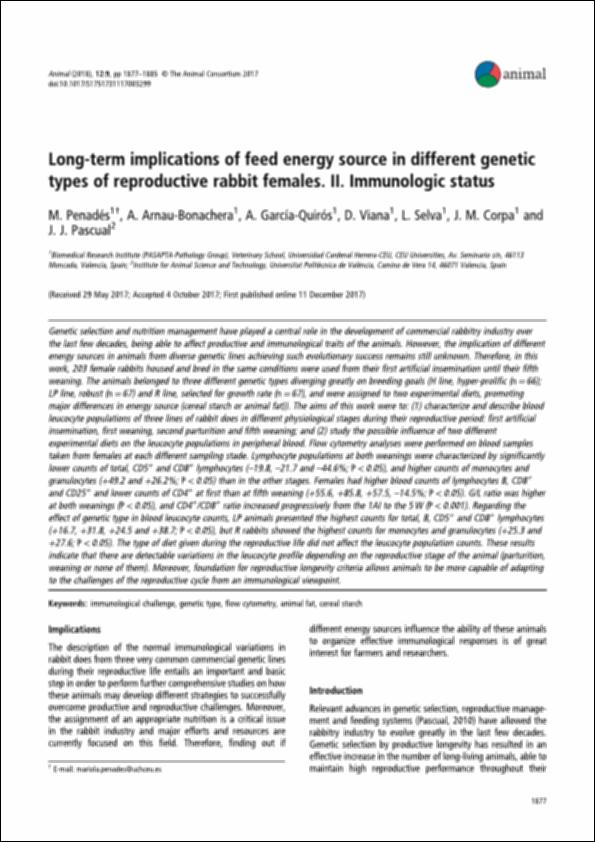Please use this identifier to cite or link to this item:
http://hdl.handle.net/10637/10497Long-term implications of feed energy source in different genetic types of reproductive rabbit females. II, Immunologic status
| Title: | Long-term implications of feed energy source in different genetic types of reproductive rabbit females. II, Immunologic status |
| Other Titles: | Immunologic status |
| Authors : | Penadés Fons, Mariola Arnau Bonachera, Alberto García Quirós, Ana Viana Martín, David Selva Martínez, Laura Corpa Arenas, Juan Manuel Pascual Amorós, Juan José |
| Keywords: | Conejos - Inmunología.; Rabbits - Immunology.; Flow cytometry.; Citometría de flujo.; Conejos - Alimentación.; Rabbits - Genetics.; Cereales.; Grain.; Almidón.; Starch.; Conejos - Genética.; Rabbits - Feeding and feeds. |
| Publisher: | Cambridge University Press |
| Citation: | Penadés, M., Arnau-Bonachera, A., García-Quirós, A., Viana, D., Selva, L., Corpa, J. M. & Pascual, J. J. (2018). Long-term implications of feed energy source in different genetic types of reproductive rabbit females. II. Immunologic status. Animal, vol. 12, i. 9 (sep.), pp. 1877–1885. DOI: https://doi.org/10.1017/S1751731117003299 |
| Abstract: | Genetic selection and nutrition management have played a central role in the development of commercial rabbitry industry over the last few decades, being able to affect productive and immunological traits of the animals. However, the implication of different energy sources in animals from diverse genetic lines achieving such evolutionary success remains still unknown. Therefore, in this work, 203 female rabbits housed and bred in the same conditions were used from their first artificial insemination until their fifth weaning. The animals belonged to three different genetic types diverging greatly on breeding goals (H line, hyper-prolific (n=66); LP line, robust (n=67) and R line, selected for growth rate (n=67), and were assigned to two experimental diets, promoting major differences in energy source (cereal starch or animal fat)). The aims of this work were to: (1) characterize and describe blood leucocyte populations of three lines of rabbit does in different physiological stages during their reproductive period: first artificial insemination, first weaning, second parturition and fifth weaning; and (2) study the possible influence of two different experimental diets on the leucocyte populations in peripheral blood. Flow cytometry analyses were performed on blood samples taken from females at each different sampling stade. Lymphocyte populations at both weanings were characterized by significantly lower counts of total, CD5+ and CD8+ lymphocytes (–19.8, –21.7 and –44.6%; P<0.05), and higher counts of monocytes and granulocytes (+49.2 and +26.2%; P<0.05) than in the other stages. Females had higher blood counts of lymphocytes B, CD8+ and CD25+ and lower counts of CD4+ at first than at fifth weaning (+55.6, +85.8, +57.5, –14.5%; P<0.05). G/L ratio was higher at both weanings (P<0.05), and CD4+/CD8+ ratio increased progressively from the 1AI to the 5 W (P<0.001). Regarding the effect of genetic type in blood leucocyte counts, LP animals presented the highest counts for total, B, CD5+ and CD8+ lymphocytes (+16.7, +31.8, +24.5 and +38.7; P<0.05), but R rabbits showed the highest counts for monocytes and granulocytes (+25.3 and +27.6; P<0.05). The type of diet given during the reproductive life did not affect the leucocyte population counts. These results indicate that there are detectable variations in the leucocyte profile depending on the reproductive stage of the animal (parturition, weaning or none of them). Moreover, foundation for reproductive longevity criteria allows animals to be more capable of adapting to the challenges of the reproductive cycle from an immunological viewpoint. |
| Description: | Este artículo se encuentra disponible en la siguiente URL: https://www.sciencedirect.com/science/article/pii/S1751731117003299?via%3Dihub |
| URI: | http://hdl.handle.net/10637/10497 |
| Rights : | http://creativecommons.org/licenses/by-nc-nd/4.0/deed.es |
| ISSN: | 1751-7311 1751-732X (Electrónico) |
| Issue Date: | 1-Sep-2018 |
| Center : | Universidad Cardenal Herrera-CEU |
| Appears in Collections: | Dpto. Producción y Sanidad Animal, Salud Pública Veterinaria y Ciencia y Tecnología de los Alimentos |
Items in DSpace are protected by copyright, with all rights reserved, unless otherwise indicated.


